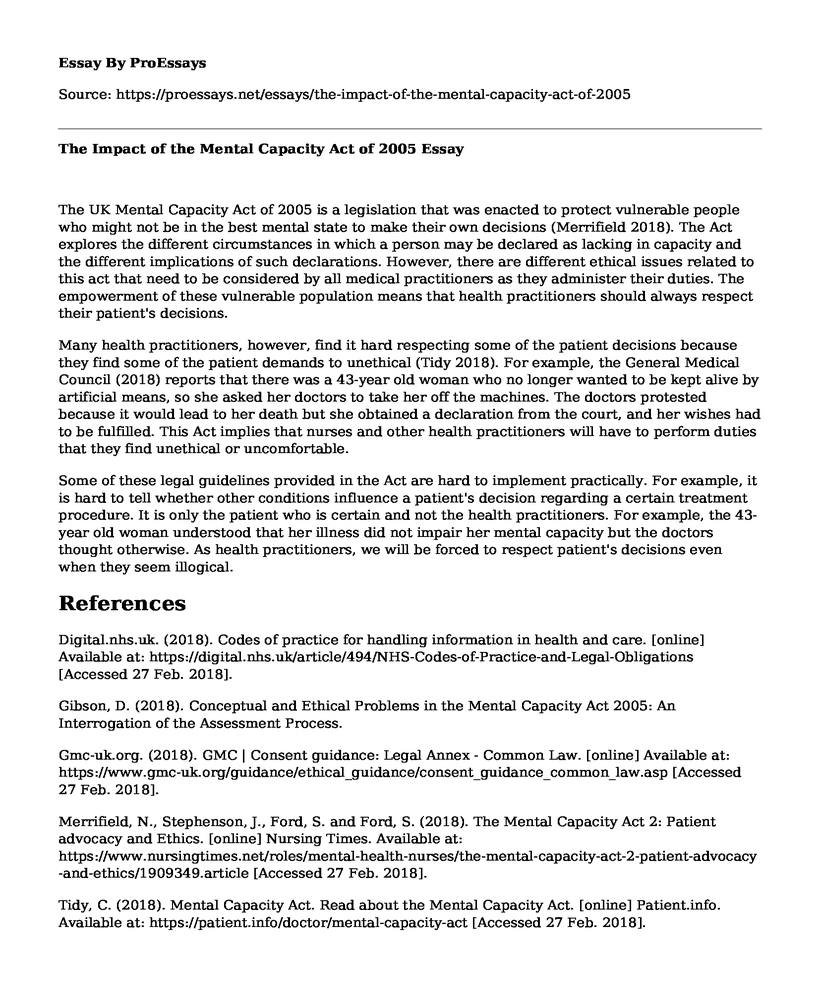The UK Mental Capacity Act of 2005 is a legislation that was enacted to protect vulnerable people who might not be in the best mental state to make their own decisions (Merrifield 2018). The Act explores the different circumstances in which a person may be declared as lacking in capacity and the different implications of such declarations. However, there are different ethical issues related to this act that need to be considered by all medical practitioners as they administer their duties. The empowerment of these vulnerable population means that health practitioners should always respect their patient's decisions.
Many health practitioners, however, find it hard respecting some of the patient decisions because they find some of the patient demands to unethical (Tidy 2018). For example, the General Medical Council (2018) reports that there was a 43-year old woman who no longer wanted to be kept alive by artificial means, so she asked her doctors to take her off the machines. The doctors protested because it would lead to her death but she obtained a declaration from the court, and her wishes had to be fulfilled. This Act implies that nurses and other health practitioners will have to perform duties that they find unethical or uncomfortable.
Some of these legal guidelines provided in the Act are hard to implement practically. For example, it is hard to tell whether other conditions influence a patient's decision regarding a certain treatment procedure. It is only the patient who is certain and not the health practitioners. For example, the 43-year old woman understood that her illness did not impair her mental capacity but the doctors thought otherwise. As health practitioners, we will be forced to respect patient's decisions even when they seem illogical.
References
Digital.nhs.uk. (2018). Codes of practice for handling information in health and care. [online] Available at: https://digital.nhs.uk/article/494/NHS-Codes-of-Practice-and-Legal-Obligations [Accessed 27 Feb. 2018].
Gibson, D. (2018). Conceptual and Ethical Problems in the Mental Capacity Act 2005: An Interrogation of the Assessment Process.
Gmc-uk.org. (2018). GMC | Consent guidance: Legal Annex - Common Law. [online] Available at: https://www.gmc-uk.org/guidance/ethical_guidance/consent_guidance_common_law.asp [Accessed 27 Feb. 2018].
Merrifield, N., Stephenson, J., Ford, S. and Ford, S. (2018). The Mental Capacity Act 2: Patient advocacy and Ethics. [online] Nursing Times. Available at: https://www.nursingtimes.net/roles/mental-health-nurses/the-mental-capacity-act-2-patient-advocacy-and-ethics/1909349.article [Accessed 27 Feb. 2018].
Tidy, C. (2018). Mental Capacity Act. Read about the Mental Capacity Act. [online] Patient.info. Available at: https://patient.info/doctor/mental-capacity-act [Accessed 27 Feb. 2018].
Cite this page
The Impact of the Mental Capacity Act of 2005. (2022, Mar 29). Retrieved from https://proessays.net/essays/the-impact-of-the-mental-capacity-act-of-2005
If you are the original author of this essay and no longer wish to have it published on the ProEssays website, please click below to request its removal:
- The Influence of Stress and Exhaustion on Body Cells and Muscles Essay
- Research Paper on Police Diversity in the Post-Ferguson Era: Its Impact on Crime Rates
- Essay Example on Leadership Philosophy: Guiding Principles for Success
- Mood Organ: Tuning to Emotional States of Mind - Essay Sample
- Essay Example on Influence: Its Good and Bad Impact on Us
- Restorative Justice: Repairing Crime's Effects on Perpetrators & Communities - Essay Sample
- Free Essay Sample on Stress: A Silent Killer of Health and Wellbeing







